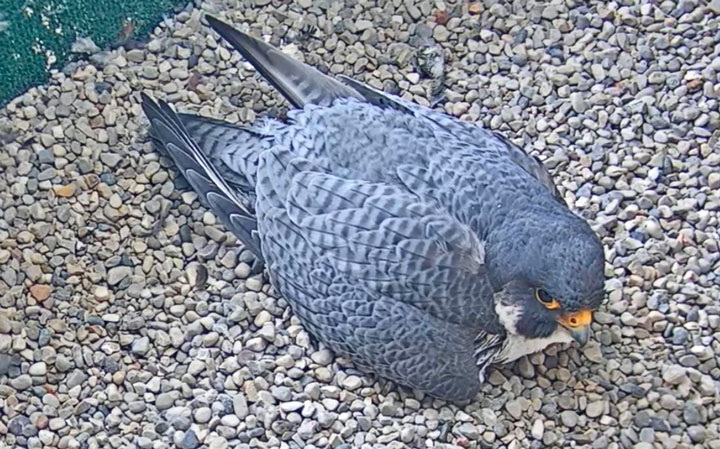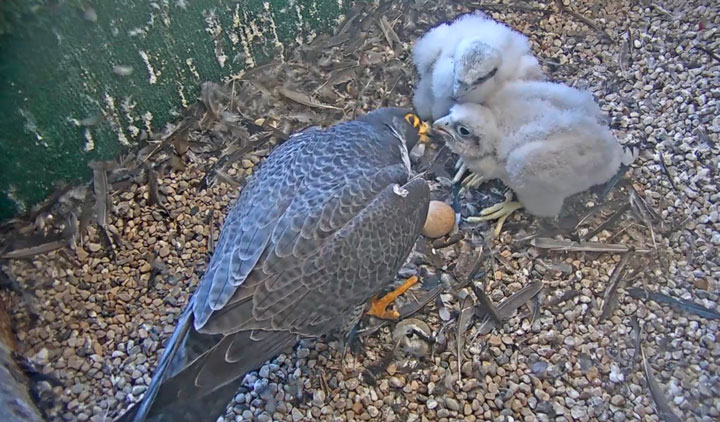Peregrine Falcons
At UW Oshkosh

UW Oshkosh may not be the Home of The Falcon, but it is home to a continuing saga of Peregrine Falcon excitement. Since 2011, the roof of Gruenhagen Conference Center has been home to a nesting pair of falcons every year.
See below for a look at what’s happening in the UW Oshkosh nesting box right now, and read an overview of peregrine falcon activity at UW Oshkosh since 2011.
Falcon Project History at UW Oshkosh
In 2011, Greg Septon, founder of the Wisconsin Peregrine Falcon Recovery Project, was contacted by Paul Bruce from UW Oshkosh about the possibility of constructing and installing a nesting box on campus because of many factors that are attractive to Peregrine Falcons (Falco peregrinus) and reports of falcons in the area around that time.
UW Oshkosh agreed to be a partner in the Wisconsin Peregrine Falcon Recovery Project, and Gruenhagen Conference Center was chosen as the best site for the box. With the box in place, peregrines began to notice the suitable home, and the first pair moved into the box in 2011. The pair included “Hondo” who had been produced in Sheboygan, WI, and “Deborah” who had been produced in Evanston, IL. That first spring, the pair hatched 3 chicks and raised 2 of those chicks. The female chick in spring of 2011, named Millenium, was rescued on July 11 and returned to the nesting box but was later transported to Aves Wildlife Alliance in an attempt to treat her condition as she exhibited uncommon behavior in the box. She ultimately succumbed to likely internal injury and dehydration. The one male chick, Titan, survived.
Aves has been instrumental in assisting with other UW Oshkosh falcons. In 2012, “Hondo” was treated for injuries that appeared to have occurred from a vehicle collision. His injuries did not heal enough that he would be able to hunt, so he could not be released into the wild. As a result, Aves was able to receive licensing to allow them to use “Hondo” as an ambassador bird in educational programming. “Talon” joined “Deborah” in 2013, and they retained the nest until 2016 when “Deborah” sustained injuries from a dispute when another female, “Julia,” arrived on scene. While “Talon” stepped up as the sole supporter of the four chicks that had hatched, “Deborah” was treated at Aves. One of the chicks was ultimately also taken to Aves because of the stress exhibited by the presence of “Julia.” In 2017, “Julia” claimed the nesting box with an unbanded male during that first year and then “Rupert” came along in 2018. These two continue in 2020 as the current nesting pair.
With the help of nesting boxes like we have at UW Oshkosh, Peregrine Falcons continue to thrive in the U.S. The box is cleaned each year, typically in the fall when it will not disturb the birds preparing for the spring nesting season. When the chicks hatch and are approximately three weeks old, they are given leg bands that have special letter/number combinations, which are recorded and can be used for research.


Julia (b/r) 19/W, feeding Strength and Courage – 2020
About Peregrine Falcons
Peregrine numbers had declined in the United States due to widespread use of DDT that started in the 1940s. DDT caused the eggs of peregrines and other raptor species to thin so much that many of the eggs broke during incubation. Once DDT was identified as the issue and was banned in 1972, raptors had accumulated so much DDT in their bodies and their bird numbers were so low that many species needed human help to regain their populations. In the meantime, habitat destruction was also taking away their opportunity to find proper nesting sites. So part of human intervention for Peregrine Falcons, who had been recorded on the Endangered Species List in 1970, came through the development of nesting boxes that were strategically installed high atop buildings and other structures within peregrine territories.
Help us fund the UW Oshkosh Peregrine Falcon project:
You can help us fund the UW Oshkosh Peregrine Falcon project by writing a check payable to UW Oshkosh with “Falcon project” on the memo line. Mail your check to the Sustainability Institute at the address below:
University of Wisconsin Oshkosh
SIRT
800 Algoma Blvd.
Oshkosh, WI 54901
Online donations can be submitted here.
What should I do if I find an injured falcon?
If found during campus business hours:
Call Dana Hartel, 424-4455
Call Josh Ruplinger, (920) 410-1546
If found after hours call, University Police: 424-1212
Data and Nesting Reports
Data
Cornell Lab of Ornithology – Peregrine Falcon
Falcon Watch reports – Greg Septon
Sustainability Institute for Regional Transformations
UW Oshkosh
800 Algoma Blvd.
Oshkosh, WI 54901

